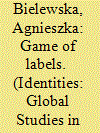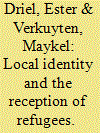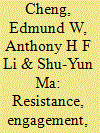| Srl | Item |
| 1 |
ID:
180572


|
|
|
|
|
| Summary/Abstract |
The aim of this paper is to explore the identification choices of highly skilled migrants employed by companies in the Wałbrzych Special Economic Zone in south-west Poland in order to discuss how their identity is constructed and performed, especially how conflictual identifications are managed. Analysis of qualitative data shows the migrants call both their place of origin and their new place of life home. They identify as inhabitants of their new city and talk about gaining some traits of Polish national identity but they stress strong national identity related to their home country. Conflicts of loyalties in these hybrid identities are solved through a label game. Migrants identify with groups at different scales, from local groups, through city and national, to supranational. By playing with the scale of groups they can avoid conflicting identifications.
|
|
|
|
|
|
|
|
|
|
|
|
|
|
|
|
| 2 |
ID:
174602


|
|
|
|
|
| Summary/Abstract |
A strong local community identity often goes together with the rejection of refugees and other migrants. However, there is also the possibility that such a local identity actually stimulates the reception of refugees. Based on the social identity perspective and our ethnographic fieldwork we examine this possibility in the context of the small town of Riace in Southern Italy. The analysis demonstrates that there is a local identity of hospitality that is construed as a continuation of the town’s past. This identity of local hospitality is enacted and maintained in various ways in the life of the town in which the mayor as an entrepreneur of the local identity plays a critical role. However, there are also some challenges to the future of the local identity of hospitality that relates to available financial resources and competition over local opportunities.
|
|
|
|
|
|
|
|
|
|
|
|
|
|
|
|
| 3 |
ID:
161453


|
|
|
|
|
| Summary/Abstract |
This article explores how the islands of Bali and Lombok were racialised through the work of Dutch racial scientist J.P. Kleiweg de Zwaan in the 1930s. An examination of both Kleiweg's published works and his local practices draws attention to the fact that racialisation occurred at different moments of anthropological work, producing different outcomes. The article concludes that anthropologists communicated different versions of racial ideas to international academics and to local communities. The Bali-Aga and Sasak, who were measured, described and photographed by anthropologists, appropriated racial categories which they found meaningful.
|
|
|
|
|
|
|
|
|
|
|
|
|
|
|
|
| 4 |
ID:
067572


|
|
|
|
|
| Publication |
London, I B Tauris, 2005.
|
| Description |
vii, 311p.hbk
|
| Standard Number |
1850439710
|
|
|
|
|
|
|
|
|
|
|
|
Copies: C:1/I:0,R:0,Q:0
Circulation
| Accession# | Call# | Current Location | Status | Policy | Location |
| 050595 | 953.6/DRE 050595 | Main | On Shelf | General | |
|
|
|
|
| 5 |
ID:
131803


|
|
|
|
|
| Publication |
2014.
|
| Summary/Abstract |
An enduring question with regard to the voluntary sector is how it can nurture civic engagement and provide public goods. A World Heritage listing for Penang highlights this question by revealing a vibrant civil society network that has made heritage conservation an issue for public discourse and policy agenda. This paper discusses how the marginalized trajectory of Penang is related to the development of its civic realm, social cohesion and local identity, which are sources of Penang's voluntarism. It then examines the engagement pattern of the Penang Heritage Trust, a leading association, which has mounted resistance against the state's failure in heritage provision. This bottom-up approach has preserved Penang's cultural heritage and associated identity, and reveals the distinct nature and capacity of Penang's voluntary sector that goes against the general pattern in Malaysia.
|
|
|
|
|
|
|
|
|
|
|
|
|
|
|
|